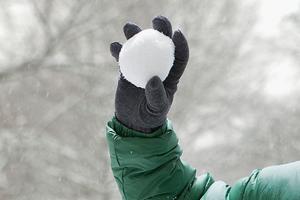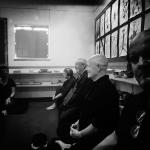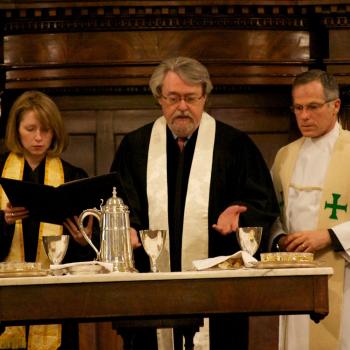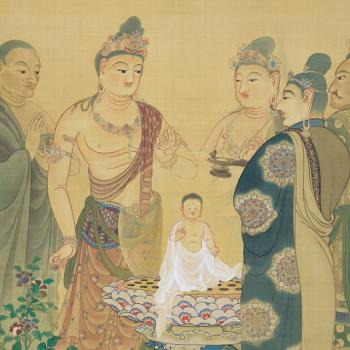I was revisiting a case in the Blue Cliff Record. In Chinese the Biyan Lu, the Twelfth century classic anthology of koans. Koans are those lovely fragments of poetry, stories of encounters, and fairy tales that point us to the heart of the great matter. Case number 42 in the anthology goes:
Layman Pang was leaving Yaoshan. Yaoshan ordered ten of his Zen students to see Pang off at the temple gate. Pang pointed to the falling snow in the air and said, “Beautiful snow-flakes! — they don’t fall on any other place.”
At that time there was a student named Zen, who said, “Where then do they fall?”
Pang gave him a slap.
Zen said, “Layman Pang, don’t be so rough.”
Pang said, “If you name yourself Zen student in such a condition, Old En [the fearful judge at the entrance of the realm of the dead] will never release you!”
Zen said, “What then would you say, Layman Pang?”
Pang slapped him again and said, “You look, but you are like a blind man; you speak, but you are like a deaf-mute.”
(Xuedou added his comment, “Why didn’t you, [Student Zen], hit him with a snowball in place of your first question?”)
From a koan perspective something pretty straight ahead. The layman, terror to all the young monks and not so young who think their clerical status should bring with it a certain deference from those whose state is meant to be supporters of the professionals. The problem with that stance was that by general assent the layman saw deeper and truer than most.
And of course a moment presented. The monks accompany the layman to the gate. He points at the snowflakes. He makes that statement.
“Good snowflakes. They don’t fall in any other place.”
Another translation goes “Beautiful snowflakes, one by one; but they fall nowhere else.”
Another translation goes “Fine snowflakes; they don’t fall elsewhere.”
What are we being invited into? Well. Here is the heart of the great matter. It’s all being laid out for us. Here the layman points to the deepest realities of our lives, the traps and the way of freedom.
Anyone familiar with the stories of Layman Pang know that these young and maybe not so young monks were well aware they were walking with a master of the way. So, that one of them was willing to speak, actually, that’s not merely a moment of courage, it is something else. He is making a statement as well as asking a question. And, It’s worth noting both the words and the action.
The Layman meets him with a slap. Not our culture. And, I suggest, not representative of the punishment this sort of action would normally indicate in that culture, either. Here we are in the dream time, and every thing presents as an opportunity, an invitation. Here in this luminous place we all parts of a whole: the layman, the monk, and the slap. And so a question. In that place where is there a difference between the layman’s pointing and query and that word “Where do they fall?” and the slap so close that there seems no distinction between the two, call and response, box and lid?
And then, as happens, it goes wrong. Caste resumes, clericalism rises instead of curiosity. As some might shout: mistake! However, with infinite care the layman brings the matter back to the fore. Despite how it might look, there is no rebuke in this story. Not in the first slap, not in the second.
What we are being invited to is the great intimate.
And with that lovely, lovely Xuedou, the anthology’s one-man Greek Chorus, pointing, cajoling, commenting, laughing, and dragging us along, once again goes right to the heart of the matter. Now there can be some confusion as to what word he thinks should spark that snowball flying. The layman’s pointing words? The monk’s question? Have a view?
But, you know, it really doesn’t matter. Xuedou reminds us. Here it is! Within the great play of life and death, here it is! Amongst the sorrow and loss: something precious and beautiful. The secret heart of our living and our dying displayed before the world.
Like a child throwing a snowball at the first word.














